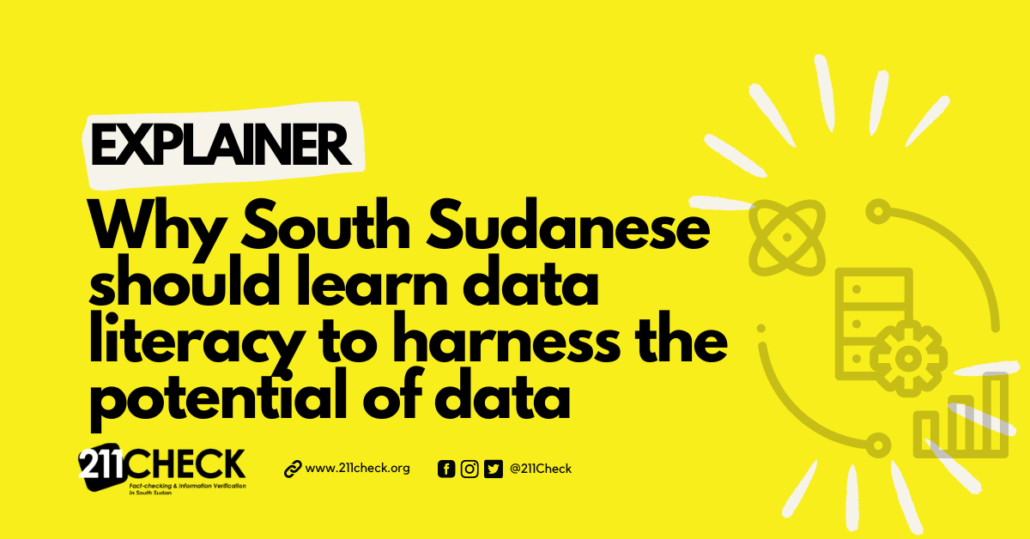Explainer: Why South Sudanese should learn data literacy to harness the potential of data
Data literacy builds confidence and empowers individuals to achieve excellent outcomes without the need for significant technical skills.
Writer: Stephen Topua
Introduction
The future speaks data—do you? According to research by Forrester Consulting to Tableau, over 2000 managers and employees were surveyed about the importance of data literacy in their organizations; 70% of employees are expected to work heavily with data by 2025 — up from just a mere 40% in 2018
Data is omnipresent, generated by an ever-expanding array of sources, from personal devices to vast networks of interconnected systems. The abundance of data presents both opportunities and challenges. Individuals need to possess data literacy skills to harness the potential of data. According to Jordan Morrow, Author of Be Data Literate, data literacy is about creating comfort and confidence in utilizing data within the organization, and it doesn’t mean everyone has to become super technical or be something they are not. Still, it means everyone can drive results with data.
Definition
Data literacy is the ability to read, understand, create, and communicate data effectively. It goes above and beyond merely interpreting numbers; it involves critical thinking, data analysis, and contextual comprehension. In today’s data-driven world, comprehending, analysing, and effectively utilising data is becoming an increasingly crucial skill.
As a skill set, data literacy is vital in empowering individuals to make informed decisions, understand complex issues, and drive innovation across various domains. According to Dr Emily Johnson, a renowned data scientist and educator, “Data literacy is not just about knowing how to interpret charts and graphs; it goes beyond that. It’s about critically assessing data quality, identifying biases, and using data to make informed decisions.”
This highlights that data literacy is confined to technical skills and involves a broader understanding of data’s context and implications.
Important data terms:
- Data Analysis: Examining, cleaning, transforming, and interpreting data to uncover patterns, trends, and relationships.
- Data Visualization: The graphical representation of data to present complex information clearly and easily understandable.
- Data Ethics: The moral principles and guidelines governing data’s responsible and ethical use, including data privacy and security considerations.
- Data Quality: The accuracy, reliability, and consistency of data, ensuring it is fit for its intended purpose.
- Data Collection: The systematic process of gathering raw data from various sources for analysis and decision-making.
- Data Cleaning: Identifying and correcting errors, inconsistencies, and inaccuracies in data to improve its quality.
- Data Privacy: Protecting individuals’ personal information from unauthorised access, use, or disclosure.
- Data Security: Measures and practices put in place to protect data from unauthorised access, loss, or theft.
- Data Governance: The overall management and control of data within an organisation to ensure data quality, security, and compliance.
- Big Data: Huge and complex data sets that require advanced technologies and analytics for processing and analysis.
- Machine Learning: A subset of artificial intelligence that enables computers to learn and improve from experience without being explicitly programmed.
- Data Warehouse: A centralised repository that stores and organises large volumes of data from different sources for analysis and reporting.
- Data Mining: The process of extracting valuable patterns and insights from large datasets using statistical and machine learning techniques.
- Data-driven Decision Making: Using data and analysis to guide and support decision-making processes.
- Open Data: Data that is freely available for anyone to access, use, and distribute.
- Data Integration: Combining and harmonizing data from different sources creates a unified view.
- Data Storytelling: The art of presenting data and analysis in a compelling and engaging narrative to communicate insights effectively.
- Data Culture: an environment where decisions are consistently backed by data and everyone within the organization, regardless of their role, is encouraged and empowered to use data in their work. It is a culture of inquiry, curiosity, and data-informed decision-making.
Data literacy skills encompass various aspects. Firstly, it involves knowing which data is appropriate and relevant for a specific purpose, ensuring that the data selected aligns with the intended goal. Data literacy also entails understanding and interpreting data visualizations, and deriving insights and meaning from graphical data representations. Another crucial skill is the capacity to think critically about the information extracted through data analysis, evaluating its validity, accuracy, and potential limitations.
Being proficient in data literacy also means understanding data analytics tools and methods and knowing when and where to apply them to extract meaningful insights. It involves recognising instances where data may be misrepresented or used misleadingly, enabling individuals to identify and address any inaccuracies or biases within the data. Lastly, data literacy encompasses communicating data-driven information to individuals needing a more robust background in data literacy, employing effective data storytelling techniques to convey complex findings clearly and compellingly.
Importance of Data Literacy:
Data literacy is a skill that goes beyond the realm of data analysts and scientists. It is essential for everyone, from students to policymakers, to navigate the data-driven landscape effectively. Data literacy is not just about knowing how to use a spreadsheet or read a graph; it’s about developing a mindset that questions, explores, and derives insights from data. It empowers individuals to be informed decision-makers in an increasingly data-saturated world.
Data literacy is a key enabler of evidence-based decision-making. With the ability to comprehend data and draw meaningful conclusions, individuals can avoid making uninformed choices that may have adverse consequences.
Ways of improving your data literacy skills
There are various approaches to enhancing your data literacy skills. To begin, you might take advantage of online courses provided by companies such as Coursera and Udemy. These courses cover various topics, starting with fundamental data skills and advancing to advanced machine-learning techniques. It is also advised that you take an introductory statistics course to understand the underlying principles of data and analytics and a data visualization course to communicate data insights effectively.
To become more comfortable with data, you should study your company’s datasets using management dashboards or business intelligence tools. Take advantage of the opportunity to go into and investigate various reports for various periods. If your present role restricts your data access, don’t hesitate to request it. Finding a data mentor is another crucial step in increasing data literacy. This mentor does not have to be a data professional; anyone comfortable using the company’s reporting tools and making data-driven decisions could play this role.
If you’re concerned or believe you’re not naturally drawn to statistics, shifting your emphasis to the benefits of using data in your work can be beneficial. Recognise how data may help you better understand your target audience, uncover market gaps, enable better decision-making, support presentations with factual information, and wow your bosses. It is also critical to practice asking meaningful questions about the data you deal with. Understand the origins, validity, and any biases of the data. Exploring the topic of bias in data and artificial intelligence can be eye-opening and help you ensure that your organization’s decisions are based on accurate and fair facts.
Finally, don’t let fear or doubt stand in your way of achieving data literacy. Accept the opportunity to learn and improve, recognising that strengthening your data abilities will aid your professional development in various ways.
Conclusion:
Data literacy is fundamental in the data-driven era, shaping how individuals interact with information and make decisions. Data literacy becomes an indispensable skill for individuals to thrive in personal and professional domains as data grows exponentially. By embracing data literacy, individuals can transform data into knowledge, making informed decisions that positively impact their lives and society.
Data literacy is a critical skill set in our data-driven world. It empowers individuals to make informed decisions, contributes to organizational success, and improves various aspects of society, from education to healthcare. As we navigate an increasingly complex and data-rich landscape, fostering data literacy among individuals becomes paramount.
To ensure accuracy and transparency, we at 211 Check welcome corrections from our readers. If you spot an error in this article, please request a correction using this form. Our team will review your request and make the necessary corrections immediately, if any.









Leave a Reply
Want to join the discussion?Feel free to contribute!